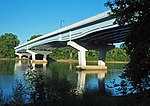Webber-Camden, Minneapolis
Neighborhoods in MinneapolisTwin Cities, Minnesota geography stubs

Webber-Camden is a neighborhood in the Camden community of Minneapolis. Its boundaries are Penn and Newton avenues to the west, the Canadian Pacific Railway tracks to the north, Interstate 94 to the east, and Dowling Avenue to the south. The neighborhood was just known as "Camden" until 1995, when the city added "Webber" to the name. Webber Park and Webber Parkway are located in the neighborhood.
Excerpt from the Wikipedia article Webber-Camden, Minneapolis (License: CC BY-SA 3.0, Authors, Images).Webber-Camden, Minneapolis
North 40th Avenue, Minneapolis Camden
Geographical coordinates (GPS) Address Nearby Places Show on map
Geographical coordinates (GPS)
| Latitude | Longitude |
|---|---|
| N 45.0293 ° | E -93.2998 ° |
Address
Crystal Lake Cemetery
North 40th Avenue
55412 Minneapolis, Camden
Minnesota, United States
Open on Google Maps







